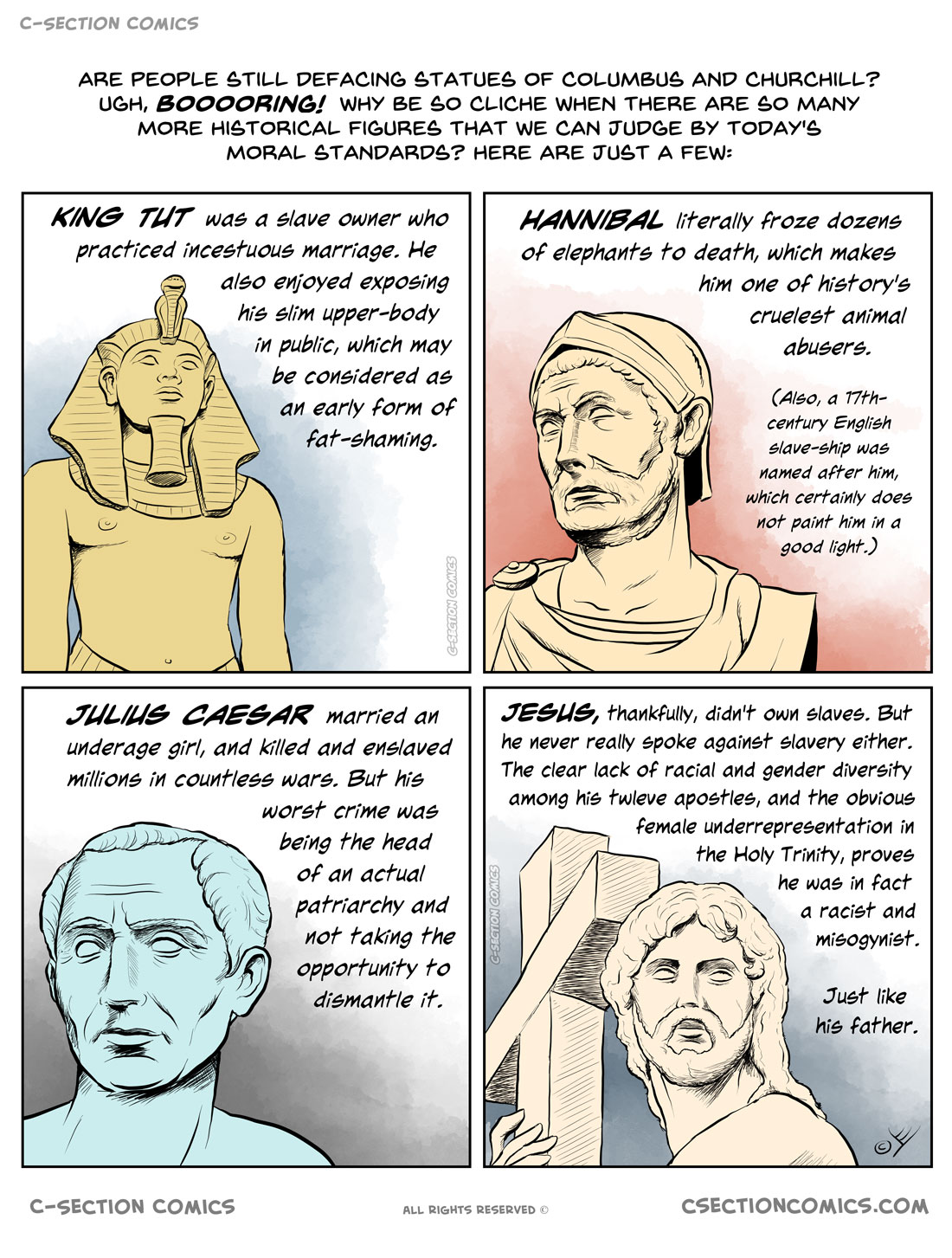Hannibal killed elephants, the Alps are now their graves.
Caesar was a patriarch (like all male Romans were).
Jesus? A misogynist (you know, like young Bill Burr).
Jefferson owned slaves (about six hundred, give or take).
Edward the first had Wallace’s head put on a stake.
He also led an ethnic cleansing – all of England’s Jews
had to leave to country, and they didn’t get to choose.
Columbus fought the natives, he killed and captured slaves,
took their gold and sent it back to Spain across the waves.
Suleiman the First, he had a sex slave ,Polish girl.
(Ottomans had sex slaves ’till a century ago!)
History is full of awful things, mankind ain’t pure.
Those who do not know it will repeat it, that’s for sure.
But should we judge them all by moral standards of today?
I refuse to do it, but I get people who may.
————
I’m really not sure how I feel about the latest statue defacing of historical figures such as Winston Churchill and Christopher Columbus. I’ll rephrase that – the Churchill thing is pure dumbness – how is the man who led Great Britain in its fight against Nazi Germany suddenly considered the bad guy?! But I do understand how Christopher Columbus can be seen as a negative character in history.
This tweet by Dr. Einat Wilf gives an interesting point of view I can easily relate to (especially since I’m Jewish):
“If Jews took down symbols of their discrimination, oppression, persecution, ethnic cleansing and genocide, not a stone or a flag would remain across the Western and Islamic worlds. Human history is mostly one of brutality and exploitation. To move forward we remember, not erase.”
As Dr. Wilf mentioned, Europe is filled with monuments of rulers and other historical figures who persecuted my people. The Catholic Monarchs Ferdinand and Isabella, for example, are responsible for the ethnic cleansing of Jews from Spain (which peaked in 1492). I’ve traveled in Spain and have been in a monument dedicated to the two, but I’ve never felt any urge to deface their statues. For me they’re historical figures, who did awful things to my people as well as other peoples (they’re the monarchs who sent Columbus to his voyage). But they’re part of Spain’s history, for better or for worse.
On the other hand, I try to think how I’d react if I saw a statue of Adolf Hitler in Germany. Two of my grandparents survived the Jewish Holocaust, and both are the sole survivors of their respective families – meaning their entire families were destroyed. So in that case it’s a more recent experience, and much closer to me personally. I guess seeing a statue of Hitler would stir anger in me. But maybe if the plaque below the statue would mention his terrible acts, It’ll be easier for me to see the statue as a way of remembering the person and his horrible deeds, knowing he was real and was responsible for those great atrocities.
So yes, I am confused. But one thing I’m less confused about: I don’t like mobs. If a statue is to be removed, it shouldn’t be by vandals. It should be taken down in orderly manner, probably after some kind of majority vote place among the people who live in the area took place. The statue should certainly not be destroyed. Rather, it should be taken to the museum, so that history is not erased or forgotten. Otherwise, we’re no different than the Taliban blowing up statues in Afghanistan for not conforming with their religious and ideological beliefs.
Last, judging historical figures by modern standards does not make a lot of sense to me. Hitler, Genghis Khan, Attila – were all considered ruthless, vicious and extremely cruel even by the standards of their own times. But different historical periods had different standards. Slavery was relatively common in the ancient world, even among the most enlightened and civilized cultures. When a city was captured after a long siege, it was not uncommon for their citizens to be murdered, raped, enslaved – women and children included. In many societies children, and sometimes women, were considered the property of men. The Egyptian Pharaohs practiced incestuous marriage, and Roman noblemen used to marry young teenage girls.
Future generations may question our way of living – maybe they’ll question how we treated the planet, or how we depleted its resources, or how we consumed the flesh of other living things, or the fact that we’re still waging wars, or the way wealth is distributed in our societies. That does not necessarily make us evil. Most of us are living by standards that feel right to us, but are probably different from the ones that our children or grandchildren will live by.
————
Here’s a comic where I judge historical military uniforms by modern standards.
And here’s a comic taking place back in medieval times.
————
You can judge my past comics by modern standards on Instagram and Twitter.


